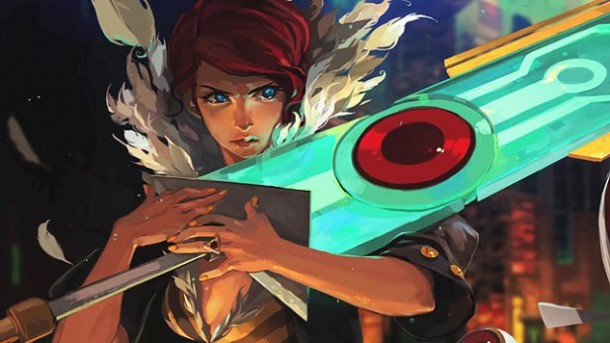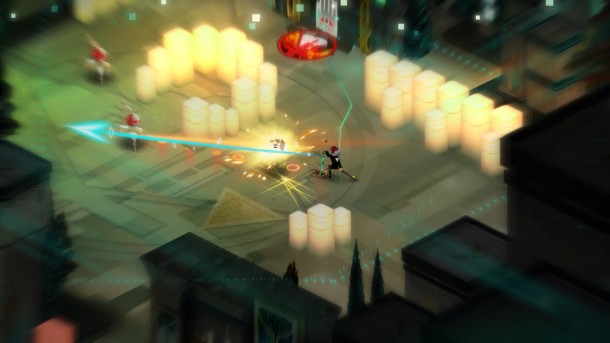Supergiant Games is no stranger to melancholy. Bastion, the developer’s last game, had more than its share of depressing undertones, set in a world annihilated by racism and inherited by synthetic slaves. It didn’t hurt that the game’s story and characters were infinitely sympathetic, even though only one of them ever spoke.
Now we have Transistor, a game which sees Supergiant make the jump from science-tinged fantasy to fantastical science fiction.
The new protagonist, a singer named Red, resides in Cloudbank City. At first blush, it’s easy to write off Cloudbank as a cyberpunk aesthetic, but like Bastion before it, further investigation shows the “almost, but not quite” style wholly unique to Supergiant Games. The demo I saw showed the performer taking possession of a talking sword (voiced by the always increasingly incredible and prolific Logan Cunningham, a.k.a. Rucks, the narrator from Bastion.)
After taking up this sword — the titular Transistor — Red runs off to hunt down the five assassins who attacked her, managing only to steal her voice. In her way stands The Process, the as-yet unidentified creatures or machines that are swallowing up the world before her.
Bastion, like much fantasy fiction in non-colloquial settings, had issues drumming up pathos. It was easy to care for the few characters we saw, but those swallowed up the apocalyptic Calamity could be harder to empathize with, thanks to their fanciful world and deaths. Transistor, like most great science fiction, has the advantage of being mundane. We see many more edges of our own world in Cloudbank City, and its inhabitants cut down by The Process. The environment is littered with advertisements, traffic infrastructure, conventional vehicles, and at least a single street poster leading to one of many moments which sent a chill down my spine during the hands-on demo.
The game still has its share of Supergiant brand craziness, of course. Red can “read” objects and characters, allowing her to see often meaningless stats, such as a corpse’s former personality, or the number of kills her sword has notched. Minor style choices like this feel quirky, abstract, yet at the same time, somehow perfectly fitting — as if it would make less sense if they weren’t there.
While the game looks worryingly similar to Bastion on its face (worrying because anything less than originality from Supergiant at this point would be a shame, not because Bastion played poorly) it functions quite differently.
Attacks are still mapped to the face buttons, however, the Transistor brings with it the ability to stop time and plot out actions. A single button press allows Red to expend an energy meter, scripting attacks and movement all the while. Another tap lets the strategy play out in real time. This allows her to get in critical backstabs, and hit more enemies with a single blow, but strikes a universal cooldown on her attacks.
The action/strategy mash-up on the gameplay feels right at home with the magic realism of Cloudbank.
All the while, Cunningham’s narration keeps grounds the package in a sense of the forlorn. The demo ended with Red riding a motorcycle ever faster towards her assailants, determined and unafraid, while the Transistor on her back hopefully, pleadingly begs her to not let go.
Chills.
[Update: Transistor is planned for a 2014 release.]

![E3 2013: Transistor Sends Shivers Down My Spine [Hands-On]](https://www.sidequesting.com/wp-content/uploads/transistor-image.jpg)



3 Comments